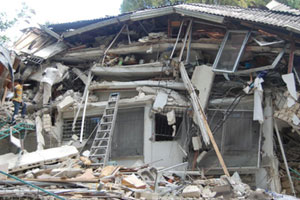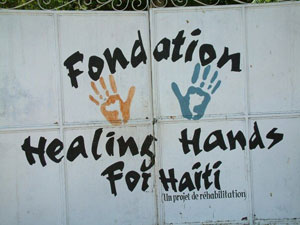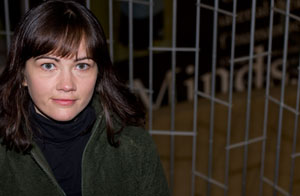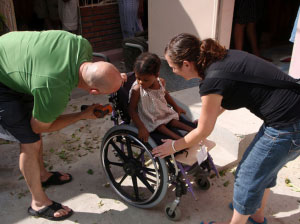| ||
| ||
| ||
| ||
|
While Maritime volunteers are still reeling from images of their pancaked health centre in Port-au-Prince, they’re already anticipating how to deliver therapeutic rehabilitation in the months and years to come.
An assessment mission is the most immediate priority, and Halifax-based occupational therapist Ruth Duggan (BSc OT ’88, MSc OT ’02) has been selected as part of this early response team.Ěý
SheĚýdeploysĚýto HaitiĚýthis week whenĚýshe'll joinĚýHandicap International. She’ll fly into Santo Domingo, Dominican Republic, and take an air shuttle to Port-au-Prince.
“The immediate medical needs are not our forte, but the ongoing rehabilitation is and we had a prosthetics site where we were making artificial arms and legs to replace lost limbs,” she says.
Providing equipment, treatment – and most significantly, training – for Haitians is the raison d’etre for Team Canada Healing Hands. The Kay Kapab clinic for rehabilitation services offered a familiar base for local volunteers, including many in the Dalhousie community whose concern is heightened in the earthquake’s aftershock.
“The clinic itself looks like it will have to be bulldozed,” says Ms. Duggan. “I did a lot of work in Jacmel, not too far from Port-au-Prince, and when I saw pictures on CNN from there, showing the buildings falling down, I burst into tears,” she says.
The Halifax-based occupational therapist immediately began reaching out to former colleagues to update the website for . Through the website, the group is collecting donations and gathering names of volunteers who wish to assist with the current emergency.ĚýĚý
“I will go back as soon as I can,” says occupational therapy graduate student Alisa Brown. “You just really, really want to be there and it’s frustrating to be here – but I will have more to offer as soon as I graduate in June.”
In fact, her decision to become an occupational therapist was motivated by a mission to Haiti, where she found herself visiting orphanages while therapists assessed children with special needs.
“The Haiti experience certainly led me here, since many of the therapists, doctors and volunteers were Dal grads. It was life changing for me,” says Ms. Brown.
Melissa Grant (BSc OT ’07), of Fredericton, is already considering her return to Haiti, with the long-term impact of injuries on her mind.Ěý
“Disability rates will increase as a result of either direct impact of falling debris, or from lack of medical attention to injuries,” says Ms. Grant.
At this early stage, donations are probably the most meaningful way that Canadians can help Haitians, says Ms. Duggan.
The outreach is touching a chord in many former colleagues, including Corinne Cash, who volunteered in Haiti while she was an international development studies student at pilipiliÂţ».
“I made a donation to the relief efforts,” says Ms. Cash, now a graduate student in Ontario. “I donated to Healing Hands because I know that the money will go to good use, that the challenges for disabled people are astounding – and that there will be many people after this who will require rehabilitation services.”
Even before the current disaster, Haiti had no national rehabilitation centre and so their emphasis on training local rehabilitation workers is crucial.
“That way we can feel our hands are there doing the work long after we have left,” says Ms. Grant. “In Creole the word kapab means to enable, which is also the backbone of occupational therapy.”
Assessment mission underway
Ruth Duggan, a Halifax-based occupational therapist, will be joining Dr. Colleen O’Connell, a physical medicine and rehabilitation specialist in Fredericton who coordinates Team Canada Helping Hands. Also participating in the mission are: Al Ingersoll, a prosthetics expert from Minneapolis; Frank Shirley, an orthotics specialist from Boston and Carl Gray, a physical therapist from Ottawa. A guest house located next to the destroyed clinic has also suffered damage but can provide an initial base of operations. The group is resolved to accelerate the planned construction of Haiti’s first Physical Medicine and Rehabilitation Institute. An emergency relief fund has been set up for local staff and their families. |
Ěý




300.jpg.lt_bcb4636a2ae0e3852f25718426460ea4.res/Haiti-(Corinne)300.jpg)

300.jpg.lt_3f478c1c4c237e87a7e315422ad66ba9.res/Haiti-(Ruth)300.jpg)